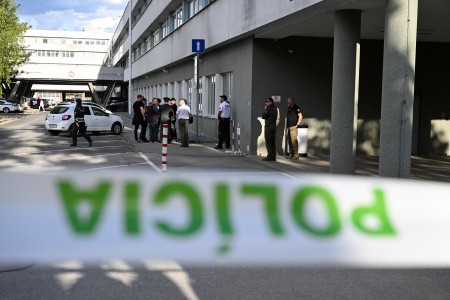By Boldizsar Gyori, Karol Badohal and Jan Lopatka
LEVICE, Slovakia (Reuters) – A 71-year-old former security guard charged on Thursday with the attempted murder of Slovak Prime Minister Robert Fico is the author of three collections of poetry who neighbours said had shown no sign of political extremism.
Fico, 59, was shot as he greeted supporters in the small town of Handlova, in central Slovakia, and underwent hours of surgery. A hospital official said on Thursday that the prime minister was in “very serious” but stable condition.
The suspect, who was apprehended at the scene, has not been named by authorities but scattered details about him began to emerge as the country struggled to make sense of the attack.
A neighbour in the modest seven-storey building in Levice, a town of about 36,500 inhabitants due south of Handlova, where the suspect lives, said he had known the man for 40 years and that he had never vented extreme political views.
“He was a polite man and wasn’t strong about politics as such, but he did feel that some of the measures of the government weren’t correct,” pensioner Mile Ludovit, 68, told Reuters through an interpreter.
“Some of the media reports say he was planning it for a month already, but there was no sign of it.”
The suspect was a former security guard at a shopping centre, the author of three collections of poetry and a member of the Slovak Society of Writers, local media reported.
News outlet Aktuality.sk cited his son as saying his father was the legal holder of a gun licence. “I have absolutely no idea what my father intended, what he planned, what happened,” it quoted the son as saying.
The son said that all he could say about his father’s views about Fico was that he did not vote for him and that his father was not a psychiatric patient.
A member of the Rainbow Literary Club in Levice told Reuters the suspect had been one of its founders. In a statement, the club condemned the attack and said that as a strictly apolitical group it had revoked his membership with immediate effect.
Peter Klinko, a club member, told Reuters he had last met the suspect about two years ago. “If I had to describe him, I can say in one word that he is a good person,” he said.
“But even a good jug carries water only until it breaks. I can’t tell you anything about his latest thought processes.”
POLITICAL STRIFE
Monika Nemcekova, an editor at a magazine in Levice and a member of the same literary club, said the suspect’s poetry sometimes dealt with difficult topics such as attitudes toward minority Roma.
In an undated video posted on Facebook, the suspect was seen saying: “I do not agree with government policy.” Reuters verified that the person in the video matched images of the man arrested after Fico’s shooting.
Reuters was able to confirm that a man seen in the footage from Slovak TV TA3 of a protest against the ruling party on April 24 matched the man arrested for the attack on Fico based on body type, facial features and hair.
The suspect appeared twice in pictures, verified by Reuters, on the Facebook page of a what media described as a since disbanded paramilitary group in 2016, but a man associated with the group told Reuters the suspect had not been a member and had only briefly met him once.
While the motives of the gunman remained murky, the shooting occurred against a backdrop of fierce political strife and polarised debate in Slovakia that intensified further in the run-up to a hard-fought presidential election last month.
“This assassination (attempt) was politically motivated and the perpetrator’s decision was born closely after the presidential election,” Interior Minister Matus Sutaj Estok said.
He described the suspect as a “lone wolf” who had radicalised himself.
An ally of Fico won the election, helping him tighten his grip on power. Since returning as prime minister last October, Fico has shifted policy quickly in what opposition figures have called a power grab.
Fico’s government has dialled back support for Ukraine and opened dialogue with Moscow while seeking to weaken punishments for corruption and dismantle a special prosecutor’s office.
Long critical of Slovakia’s mainstream media, Fico has also moved to restructure the public broadcaster in a move seen by opponents as curtailing media freedom.
Fico was forced to resign as premier amid mass protests in 2018 triggered by the contract killing of Jan Kuciak, a journalist who had been investigating high-level corruption.
(Additional reporting by Milan Pavicic, Anna Jaworska-Guidotti, Maria Laguna and Jason Hovet; writing by Niklas Pollard; editing by Nick Macfie)













